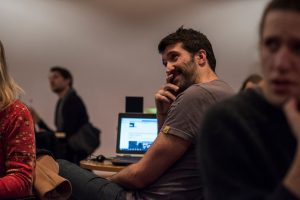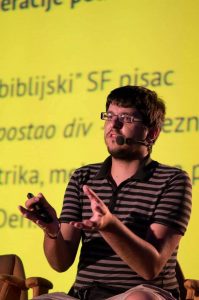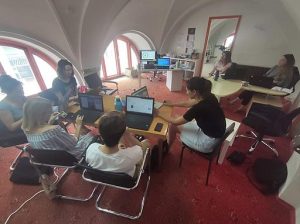The Rijeka City Library started to engage in Wikimedia activities within the library led by Z. Blace and Kristian Benić. IFLA is delighted to travel to Croatia to have a dive in this project.
1. Thank you for agreeing to participate in this interview, could you please tell us more about yourself and your collaborators?
Z: Z. Blace (~Zblace) – artist and cultural worker, active in advocating open and free digital commons with communities and institutions, cross-pollinating queer/commoning

Z. Blace, Telekomunmunist International satellite event of Transmediale in Berlin, 2016/02/26 photo by Alp Klanten
perspectives and embodied experiences across different networks and contexts… and now first Wikimedian in Residence in Croatia.
K: Kristian Benić, head of marketing and projects at Rijeka City Library, which includes all sort of activities, but most importantly for this context being the editor of our two online media projects Magazin GKR https://gkr.hr/Magazin and Brickzine https://brickzine.hr that also have printed editions periodically, as a magazine for children and parents.
2. Could you explain to us how and why this position was born within the Rijeka City Library (Croatia)?
K: Rijeka City Library is for many years seen in Croatia as one of the most progressive, innovative and fast membership growing, although at the same time it has huge infrastructural challenges. This was the first library in Croatia that established a maker-space with 3D printers GKR Lab https://gkr.hr/Lab, has one of the most effective digital communication strategies online, newsletter and generally openness to ordinary people who can write about books and more. We really want to be in the first row of the big everyday changes and at the same time empower communities that we serve. Library is not just a service, it is an active community stakeholder and can serve as a platform for progressive ideas.
Z: I was interested in GKR work before (was interviewed by their Magazine for doing an exhibition a few years ago) and also in the city as a super interesting non-capital and ofte

Photo of Kristian Benić lecture about history of geek culture in Yugoslavia, by Lucija Jančec, CC BY-SA 4.0
n border-case city that is the 2020 European Capital of Culture. I suggested that we try doing something and for them to test the format of having artist-in-residence as a wikimedian and organizer. In the pandemic they remained flexible enough to test this, though it was hard to operate so we submitted this as a rapid grant proposal to Wikimedia Foundation. We are remote, but learning things online on the fly and it is an interesting challenge to navigate the Wikimedia world where (almost) nothing is hidden/deleted, but many things are non-obvious.
3. Have you heard of a similar job in the library or GLAM sector in Croatia before? If not, what do you think about the creation of such a position could mean?
K : I am also not aware of activities with Wikimedia in Croatia. That is a little bit strange because concepts like one Wikipedia develops is perfect for all sorts of librarian activities. Wikipedia changed the role and meaning of printed encyclopedias which used to be one of the most important parts of traditional libraries.
Z: In short this is an exception and first step. I reached out to WMF to ask and indeed it seems that this is a first WiR position in Croatia, so fairly late, but also not too surprising considering the terrible reputation Croatian instance of Wikipedia has for about a decade. GLAM sector in Croatia is not really univocal or even coordinated around policies like digital commons, so I hope to advance that in both the city of Rijeka, Croatia and the region. Think my experience as a new media practitioner and cultural networker is good for a start as WiR now on the smallest WMF experimental grant, but in future different types, scales, resources, plans and capacities should be developed once basic understanding exists.
4. What is the development strategy on Wikimedia projects within your institution? Or do you have to create your roadmap?
K: For our library all of this is really new. With Z. we are actually learning about potentials and searching for the best options in the future. But the general idea is to form some kind of local community which is interested in creating high quality content for Wikipedia/Wikimedia and to empower a few librarians for educational activities, try some new event formats…
Z: We are in the learning, roadmap building phase so hope to have the first version of ‘strategy’ by the end of this harsh year (that will include reflecting on #Rijeka2020 and 20 years Wikipedia anniversary). We try to establish basis for Croatian GLAM coordination with Multimedia Institute that did pioneering work on CreativeCommons, but also establish new actions like our crossover of established #WikiLovesLibraries and #WikiLovesMonuments with ~OkGsG and ~GK_Ivan_Vidali remote libraries that operate as cultural centers). We also did #femWikiRAINBOW as an intervention into CEE Spring translation event, than few small local workshops (#1, #2, #3), presentations and follow-up with education, outreach and networking to individuals, groups, NGOs, institutions before the end of 2020.
All this only makes sense if there are ripple and multiplier effects that go in directions of different communities and stakeholders. Only in sinergy significant changes can happen.

Wikimedia workshop in Rijeka with Z Blace, Kristian Benić, CC BY 4.0
5. How do you think Wikimedia projects support the work and objectives of libraries?
K: As I said, Wikimedia projects seem perfect for libraries and librarians because they have skills and approaches that can be really useful in the post-factual world. At the same time libraries are some kind of open spaces which have a role to empower communities, they are used by all sorts of different groups so they can be really helpful in removing some fog around Wikimedia.
Z: Libraries are super important as cultural (infra)structures that both preserve and bring coherence in the super complex and problematic times. Kristian used the post-factual world example, but I would also add post-social (here post-socialist and pseudo-capitalist). Much of the shared ‘norms’ have either collapsed (like a sense of communal good and responsibility) or have been reducing (like middle-class life quality and public services).
We live in “a small country for a great vacation” that from soft-socialism fell into most wild privatization and corruption of (post)war mess. WikiMedia as a site of participative co-editing and co-curating, sometimes even co-production that can help re-socialize knowledge work.
It is not easy to judge for the moment as Wikimedia projects are so many and it is not super easy to get an overview and even more to be clear how to make the most of them and where to focus (they have different internal dynamics or state of adoption and even dormancy)…
Taking part in Wikimedians in Residence Exchange Network – WREN makes it a bit easier as I know who to ask for advice (at least when I can formulate questions). Hope that young librarians in Croatia will have use Wikimedia support to work with both as WiRs in 2021.